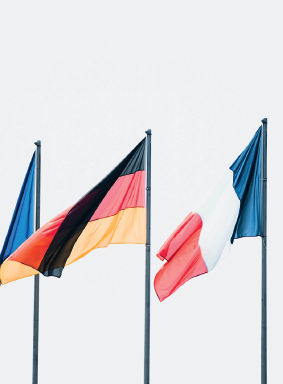Un nouveau leadership dans une nouvelle géopolitique européenne?

Parmi tous ses effets, la guerre en Ukraine provoque aussi une nouvelle course au leadership politique sur l’évolution de l’Union européenne. Certes, de façon subtile et silencieuse, au regard de l’absolue priorité commune de sauver l’Ukraine mais néanmoins réelle et lourde de conséquences. Le Royaume Uni, la Pologne et le couple franco-allemand sont les candidats au leadership d’une Europe qui, de toute évidence, ne sera plus jamais comme avant.
Londres a retrouvé dans la guerre son coeur de métier historique : la résistance, le combat, l’intransigeance démocratique, le courage. Boris Johnson avait été le premier dirigeant européen à se rendre en Ukraine au lendemain du 24 février 2022 ; et c’est à Londres que Volodymyr Zelensky fit sa première escale avant de venir à Paris et à Bruxelles, à la suite du sommet UE-Ukraine du 3 février 2023. Les Britanniques ont aussi été les premiers à accepter la livraison de chars Challenger 2 à Kiev et à proposer la formation des pilotes ukrainiens d’avions de chasse.
La Pologne, soutenue par les États Baltes, est considérée comme le nouveau centre géopolitique de l’UE, parce qu’elle en effet frontalière du conflit et qu’elle est depuis un an à la tête de toutes les politiques de soutien à l’Ukraine, qu’il s’agisse d’aide militaire, financière, ou de soutien à l’élargissement de l’UE. Le pays a accueilli sur son sol plus de 3,5 millions de réfugiés dont 1 million avec statut de protection temporaire de l’UE. Le président américain Joe Biden s’y est rendu à deux reprises en moins d’un an. Le gouvernement a décidé d’augmenter ses dépenses de défense à 4% du PIB et de doter la Pologne de la plus forte armée terrestre au sein de l’Otan. Varsovie revendique donc la place et le rôle d’un nouveau leadership européen : elle ne se prive pas de montrer du doigt la cécité historique de la France et de l’Allemagne, qui n’ont jamais voulu croire à la menace russe et n’ont eu de cesse de chercher à construire une architecture de sécurité européenne avec la Russie.
Le couple franco-allemand, traditionnellement en position de leadership, traverse en effet une zone de fortes incertitudes. L’Allemagne est devenue un maillon faible européen, par sa double dépendance commerciale envers la Russie (pour le gaz) et la Chine (20% des échanges commerciaux allemands). Le pays connaît une crise d’identité majeure, dans la mesure où son modèle d’après-guerre, fondé sur le pacifisme et l’interdépendance commerciale, a volé en éclats avec la guerre en Ukraine. Quant à la France, elle suscite critiques et méfiances, à cause de son exigence initiale de ménager la Russie, de son opposition naguère à l’élargissement de l’Otan, de sa singularité systématique par rapport aux alliés, alors que sa situation sociale et ses échecs en Afrique devraient plutôt modérer, aux yeux de beaucoup, les prétentions nationales au leadership stratégique.
Comment se jouera la partie ? La révolution géopolitique annoncée reste une illusion. Le Royaume-Uni n’a aucune chance de retrouver, via la guerre, le pouvoir (de blocage essentiellement) qu’il avait autrefois sur la construction européenne. Il peut certes redorer son image internationale mais ses cartes sont uniquement militaires et seulement déployables dans le cadre de l’Otan. Or l’Alliance Atlantique est désormais tellement validée par la guerre qu’elle n’a pas besoin des Britanniques pour être plébiscitée en Europe. Et dans le couple anglo-américain, les Européens préfèreront toujours l’Amérique, plus forte, plus crédible, plus fiable et surtout plus lointaine.
La Pologne avait raison sans doute sur la menace russe. Mais la France avait raison sur la réponse : la construction d’une défense européenne solide était nécessaire, or Varsovie n’a jamais voulu aller trop loin dans ce projet, par crainte d’un affaiblissement de l’Otan. Quant à la légitimité d’un leadership polonais, du fait du glissement géopolitique à l’Est, elle s’apparente à une sorte d’escroquerie politique : la Pologne est en effet un grand défenseur de la démocratie dans sa politique extérieure mais elle est surtout, depuis 8 ans, un sérieux fossoyeur de la démocratie libérale dans sa politique intérieure. Comment l’Union pourrait-elle accepter un tel leadership, autoritaire et contraire à l’état de droit ? Il est habile de la part des Polonais de tenter de se refaire une vertu sur le dos de l’Ukraine, il serait louable de la part des Européens de ne pas conforter les dérives polonaises.
Reste donc le couple franco-allemand, perturbé, déséquilibré, incertain, décevant certes, mais sans véritable alternative crédible. Ensemble, les deux pays représentent en effet 15 % de la population de l’UE, ils contribuent à hauteur de 44% du budget de l’UE, leurs dépenses de recherche et développement militaire atteignent 80% de celles de l’UE et ils sont surtout les deux premières puissances économiques (47% du PIB de la zone euro). Cela pèse lourd. Le maintien de l’unité franco-allemande est donc aussi indispensable pour l’avenir de l’UE que doit l’être la conversion politique de la Pologne, où sont prévus des législatives à l’automne prochain. Le jour où celle-ci redeviendra un vrai pays démocratique, conjointement avec la France et l’Allemagne, l’Europe n’aura en effet besoin d’aucun autre leadership extérieur pour défendre son modèle et ses intérêts.




